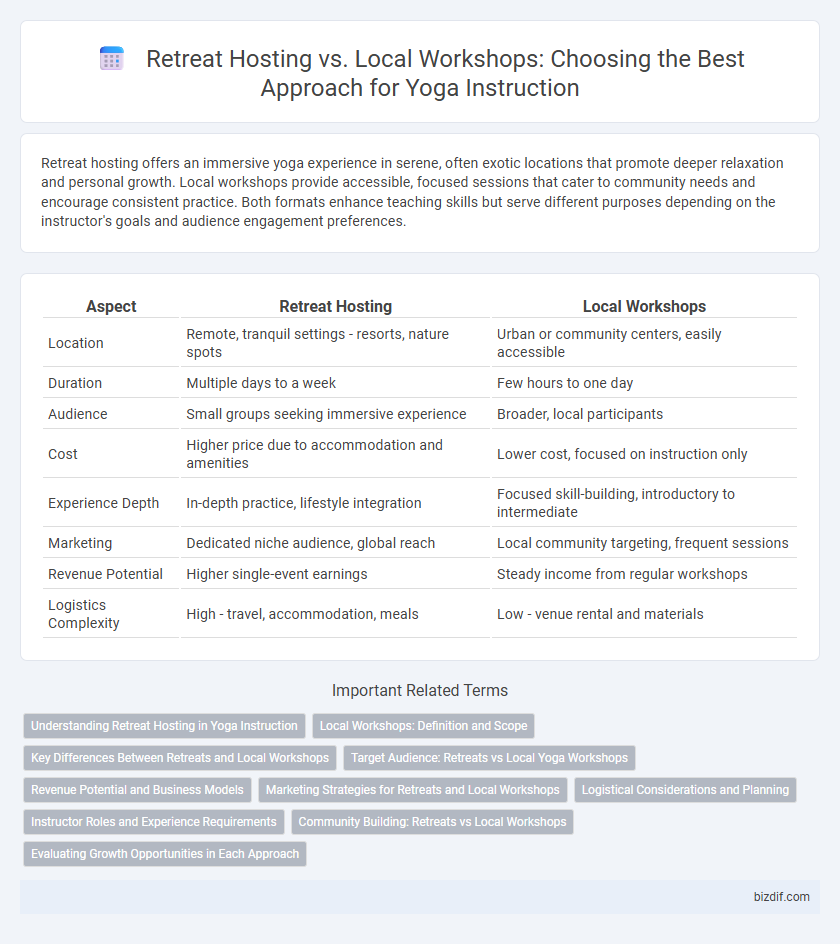Retreat hosting offers an immersive yoga experience in serene, often exotic locations that promote deeper relaxation and personal growth. Local workshops provide accessible, focused sessions that cater to community needs and encourage consistent practice. Both formats enhance teaching skills but serve different purposes depending on the instructor's goals and audience engagement preferences.
Table of Comparison
| Aspect | Retreat Hosting | Local Workshops |
|---|---|---|
| Location | Remote, tranquil settings - resorts, nature spots | Urban or community centers, easily accessible |
| Duration | Multiple days to a week | Few hours to one day |
| Audience | Small groups seeking immersive experience | Broader, local participants |
| Cost | Higher price due to accommodation and amenities | Lower cost, focused on instruction only |
| Experience Depth | In-depth practice, lifestyle integration | Focused skill-building, introductory to intermediate |
| Marketing | Dedicated niche audience, global reach | Local community targeting, frequent sessions |
| Revenue Potential | Higher single-event earnings | Steady income from regular workshops |
| Logistics Complexity | High - travel, accommodation, meals | Low - venue rental and materials |
Understanding Retreat Hosting in Yoga Instruction
Retreat hosting in yoga instruction offers immersive, multi-day experiences that deepen practice through intensive sessions, meditation, and holistic wellness activities, creating a transformative environment beyond the scope of local workshops. Unlike local workshops, which are typically shorter and focus on specific skills or topics, retreats provide extended time for personal growth, community building, and integration of mind-body principles. Hosting retreats requires advanced planning, venue coordination, and a curriculum that balances physical practice with relaxation and reflection, enhancing the instructor's ability to deliver comprehensive yoga education.
Local Workshops: Definition and Scope
Local workshops in yoga instruction focus on short-term, intensive training sessions held within a specific community or region, emphasizing skill development and practical application. These workshops often cover targeted topics such as alignment, breathing techniques, or meditation, providing accessible learning opportunities for both beginners and experienced practitioners. Local workshops foster community engagement and offer personalized guidance, distinguishing them from longer, immersive retreat experiences.
Key Differences Between Retreats and Local Workshops
Yoga retreats offer immersive experiences often set in tranquil, remote locations, providing extended periods for deep practice and holistic well-being, whereas local workshops are typically shorter, focused sessions held within community settings aimed at skill-building and targeted learning. Retreats emphasize comprehensive lifestyle integration including meditation, nutrition, and cultural excursions, while local workshops concentrate on specific techniques, postures, or themes for immediate application. The scale, duration, and depth of engagement distinctly differentiate retreats from local workshops in yoga instruction.
Target Audience: Retreats vs Local Yoga Workshops
Retreat hosting attracts yoga practitioners seeking immersive experiences, often traveling from diverse locations for extended sessions focused on deep relaxation, mindfulness, and holistic wellness. Local yoga workshops cater primarily to community members or nearby residents interested in specific skills, techniques, or themed classes for personal improvement without long-term commitment. Understanding these audience preferences allows instructors to tailor content, marketing, and engagement strategies effectively for retreats or localized workshops.
Revenue Potential and Business Models
Retreat hosting typically generates higher revenue potential through premium pricing, extended participant engagement, and inclusion of accommodation and meals, appealing to clients seeking immersive experiences. Local workshops offer a scalable business model with lower overhead and the ability to attract repeat customers regularly, focusing on volume and accessibility. Combining retreats with local workshops can diversify income streams and stabilize cash flow by balancing high-ticket events with consistent local engagements.
Marketing Strategies for Retreats and Local Workshops
Marketing strategies for yoga retreats emphasize immersive experiences, targeting travelers seeking transformative journeys through social media ads focusing on serene locations and holistic well-being. Local workshops benefit from community engagement tactics, including partnerships with wellness centers and targeted email campaigns highlighting accessibility and practical benefits. Leveraging testimonials and localized SEO enhances visibility, distinguishing retreats as destination events and workshops as convenient learning opportunities.
Logistical Considerations and Planning
Retreat hosting demands extensive logistical planning involving accommodation arrangements, meal planning, and travel coordination for participants, whereas local workshops primarily require securing a suitable venue and managing local attendance. Retreats often necessitate contracts with resorts or retreat centers and detailed scheduling to accommodate multiple sessions and downtime, while workshops focus on optimizing time for instructional content within a single location. Budget allocation for retreats must cover lodging, transportation, and amenities, contrasting with local workshops that mainly involve venue rental and marketing expenses.
Instructor Roles and Experience Requirements
Hosting yoga retreats demands instructors with extensive experience in managing diverse group dynamics and deep knowledge of holistic wellness practices to create immersive, transformational experiences. Local workshops require instructors skilled in focused teaching techniques and adaptable communication to address specific community needs and foster interactive learning environments. Both settings prioritize certified instructors, but retreats often seek those with advanced credentials and proven leadership in multi-day program coordination.
Community Building: Retreats vs Local Workshops
Retreat hosting fosters deep community building by immersing participants in multi-day experiences that encourage lasting connections through shared practices and reflection. Local workshops facilitate regular engagement within a community, offering accessible opportunities for ongoing learning and support. Both formats strengthen bonds but retreats create more intensive, transformative environments while workshops maintain consistent interaction.
Evaluating Growth Opportunities in Each Approach
Hosting yoga retreats offers immersive experiences that attract dedicated practitioners seeking deep transformation, often leading to higher engagement and premium pricing opportunities. Local workshops provide accessible, frequent touchpoints that build community connections and attract a broader audience, supporting steady growth and brand visibility. Evaluating growth potential involves assessing target demographics, resource investment, and scalability to determine which approach aligns best with long-term business goals.
Retreat hosting vs Local workshops Infographic

 bizdif.com
bizdif.com